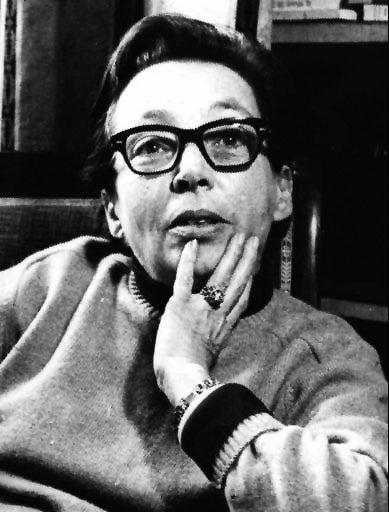|
April 23, 2014
Stanford book club spotlights Marguerite Duras' 'The Lover'
Marguerite Duras' erotic masterpiece "The Lover" is the subject of a May 12 "Another Look" book discussion in her centennial year. The work is an autobiographical tale of a teenage French girl's scandalous affair with an older Chinese millionaire in Saigon in the 20th century. By Cynthia Haven

Marguerite Duras' book "The Lover" is the topic of the "Another Look" book club discussion at the Stanford Humanities Center on May 12. (AP file photo / 1976)
Long before most Americans could find Vietnam on a map, the French ruled Indochina and its peoples in an unequal colonial stew. So when a 15-year-old French schoolgirl had a passionate affair with a wealthy 27-year-old Chinese lover in Saigon – now Ho Chi Minh City – it created a scandal. The affair eventually became a book – The Lover – and the book became a masterpiece.
The writer, Marguerite Duras, who died in 1996, would tell the story again and again throughout her lifetime, but never more compellingly than in The Lover, which was published in 1984 and sold 2 million copies.
On May 12, "Another Look" book club will celebrate and examine Duras and The Lover at 7:30 p.m. in the Stanford Humanities Center's Levinthal Hall. A discussion panel will include the moderator Blakey Vermeule, professor of English; Paula Moya, associate professor of English; and Stephen Seligman, a psychiatrist and professor from the University of California, San Francisco. The event is free and open to the public.
'Rediscovered again and again'
Vermeule said she first read the short novel as a high school student.
"It's one of these masterpieces that gets rediscovered again and again. It's a very intense book, so powerful it had slipped my mind what a truly great and subtle work of art it is," she said.
Duras herself told the New York Times in a 1990 interview that, "I write about love, yes, but not about tenderness. I don't like tender people. I myself am very harsh. When I love someone, I desire them. But tenderness supposes the exclusion of desire."
Duras was born in Gia Dinh, near Saigon. Her father fell ill and returned to France, where he died. Her widowed mother, a teacher, was bankrupted in a shady land deal. The family struggled as impoverished colonials in a small, tightly knit, gossiping community.
Duras recalls an abusive mother who had severe bouts with depression, a drug-addicted brother who beat his sister fiercely and stole from the family (and even its servants), and a beloved younger brother who died young. When she met a Chinese millionaire on the ferry crossing the Mekong River, the teenager saw a doorway to a different world. The affair continued until Duras returned to France to finish her education at 18.
In France, Duras worked in the French Résistance and became a member of the French Communist Party. She experimented with novels, plays, films, essays and memoirs.
She wrote The Lover at 70, when she was a tiny old woman, her body wracked by alcoholism and cigarettes, giving interviews that often read like a parody of what a French avant-garde writer is expected to sound like. She told The Lover story in different ways with divergent details, so much so that until the discovery of an unpublished diary, there could be doubts that the affair had happened at all. This year marks the 100th anniversary of her birth.
As Vermeule explained, "She had an intensive, almost anti-social capacity to tell the story the way she wanted to tell it, in all its violence and ugliness. The need to be utterly solitary and socially antipathetic – very rarely does one see it in women writers. It's not a pose they claim."
Duras quarreled with film director Jean-Jacques Annaud as they collaborated on the 1992 film of the book and retaliated with 1991's The North China Lover as a way of reclaiming her story. But The Lover, the book, is the one that has lingered in the public's mind.
A vision into posterity
According to Stanford's Marilyn Yalom, writing in her book, How the French Invented Love, Duras "could transform a somewhat sordid affair into a mutually passionate romance and project into posterity her vision of love as an irresistible force that penetrates through the skin, regardless of its color."
Yalom is a senior scholar at the Clayman Institute for Gender Research on campus.
South African playwright and novelist Deborah Levy wrote in 2011, "The Lover does not just portray a forbidden sexual encounter of mind-blowing passion and intensity; it is also an essay on memory, death, desire and how colonialism messes up everyone."
Levy added, "Marguerite Duras was a reckless thinker, an egomaniac, a bit preposterous really. I believe she had to be."
The "Another Look" book club focuses on short masterpieces that have been forgotten, neglected or overlooked – or may simply not have received the attention they merit. The selected works are short to encourage the involvement of Bay Area readers whose time may be limited. Registration at the Another Look website is encouraged for regular updates and details on the selected books and events.
Cynthia Haven is a visiting scholar at Stanford.
-30-
|